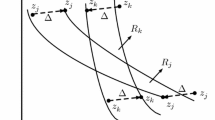Abstract
The paper extends a result in Dutta and Ray's (1989) theory of constrained egalitarianism initiated by relying on the concept of proportionate rather than absolute equality. We apply this framework to redistributive systems in which what the individuals get depends on what they receive or pay qua members of generally overlapping groups. We solve the constrained equalization problem for this class of models. The paper ends up comparing our solution with the alternative solution based on the Shapley value, which has been recommended in some distributive applications.
Similar content being viewed by others
References
Atkinson, A.B. and Bourguignon, F. (1987), Income distributions and differences in needs, in G.R. Feiwell (ed.), Arrow and the Foundations of Economic Policy. London: McMillan.
Berge, C. (1966), Espaces vectoriels topologiques, Paris, Dunod.
Champsaur, P. (1975), How to share the cost of a public good, International Journal of Game Theory 42, 113–129.
Chateauneuf, A. and Jaffray, J.Y. (1989), Some characterizations of lower probabilities and other monotone capacities through the use of Moebius inversion, Mathematical Social Sciences 17, 263–283.
Dutta, B. (1989), “The egalitarian solution and reduced game properties in convex games”, International Journal of Game Theory 19, 153–169.
Dutta, B. and Ray, D. (1989), A concept of egalitarianism under participation constraints”, Econometrica 57, 615–635.
Ebert, U. (1999), Using equivalent income of equivalent adults to rank income distributions, Social Choice and Welfare 16, 233–258.
Hardy, G.H., Littlewood, J.E. and Pólya, G. (1934), Inequalities, Cambridge: Cambridge University Press.
Hokari, T. (2002), Monotone-pathDutta–Ray Solutions on Convex Games, Social Choice and Welfare 19, 825–844.
Kalai, E. and Samet, D. (1988), Weighted Shapley values, in A.E. Roth (ed.), The Shapley Value: Essays in Honor of Lloyd Shapley, Cambridge: Cambridge University Press.
Marshall, A.W. and Olkin, I. (1979), Inequalities: Theory of Majorization and its Application, New York: Academic Press.
Mas-Colell, A., Whinston, M. D. and Green, J. R. (1995), Microeconomic Theory, Oxford: Oxford University Press.
Moulin, H. (1988), Axioms of Cooperative Decision Making, Cambridge: Cambridge University Press.
Sen, A. (1992), Inequality Reexamined, Harvard University Press.
Shafer, G. (1976), A Mathematical Theory of Evidence, Princeton, Princeton University Press.
Shapley, L. S. (1953), A value for N-person games, Contributions to the Theory of Games II, 307–317. Reprinted in H. Kuhn (ed.), Classics in Game Theory, Princeton, Princeton University Press, 1997, 69–79.
Sundberg, C. and Wagner, C. (1992), Characterization of monotone and 2-monotone capacities, Journal of Theoretical Probability 5, 159–167.
Author information
Authors and Affiliations
Rights and permissions
About this article
Cite this article
Jaffray, JY., Mongin, P. Constrained egalitarianism in a simple redistributive model. Theory and Decision 54, 33–56 (2003). https://doi.org/10.1023/A:1025091208248
Issue Date:
DOI: https://doi.org/10.1023/A:1025091208248




